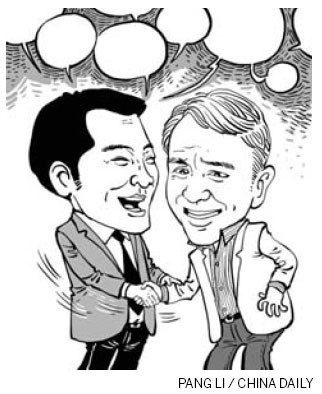Time to get a grip on Chinese handshakes
( China Daily ) Updated: 2011-01-12 14:12:34
The handshake is a worldwide form of greeting but in China this friendly custom is sometimes practiced in a different kind of way.
The handy thing to know is when to let go of the other hand.
I recently returned to Beijing after a one-year break and upon my return was reacquainted with friends, who were quick to greet me with an outreached hand.
Chinese handshakes are not bone-crunching grabs, neither are they of the wet fish variety. Don't you just hate that kind?
The shakes I've experienced are well balanced, but some of my pals do not let go.
The shaking stops, but there we are, facing one another, chatting about old times, of new beginnings, and my right hand has been captured!
Until this point, I'd never realized how much I needed my hands to communicate. Back home in Australia, my friends from Italian backgrounds would joke, saying the only way to stop their passionate, arm-waving parents was if they tied up their hands.
One time, the Chinese handholding went for a full one minute. Like a feisty Italian, my hands were tied and I was lost for words. I had to stand there, man in hand, listen and nod.
On that occasion, it was a farewell handshake and those are the worst kind because it also involves the praise game, of which the Chinese are the  absolute masters.
absolute masters.
I was bombarded with compliments and my friend was laying it on thick and fast. "We thank you so much. You have been invaluable and have helped us become bigger and better."
My hand is disabled and I'm feeling disarmed but I fire back.
"Thank you for your kind words, and I tell you the truth my friend, I thank you for your courtesy and kindness and that has enabled me to work the way I did."
My friend's smile acknowledges my praise game but he still holds my hand, we are approaching 60 seconds, and my awkwardness gauge meter is in the red zone, but he still carries on.
He's got me, I am running on empty but I play my final hand, so to speak.
"Thank you for your love, tolerance and understanding and I thank you for teaching me patience. You are a dear friend and and when can we stop holding hands?"
He laughed and let go and showed me the secret of unlocking the grip.
One can let go anytime.
In China the handshake is not limited to two or three shakes. It is a strange beast and has a whole life of its own. This is handshaking with Chinese characteristics.
I've seen this handshaking/handholding custom among older Chinese men a lot. After the shaking they will hold on for ages as they chat away in the middle of the street.
For me it's unusual, just like when younger American males hug, Italians and French fellows kiss on the cheek and New Zealand Maoris men say hello by rubbing noses.
Greeting women in China is a much easier social custom to understand. A simple "ni hao" will always do.
In the West, a kiss on the cheek is often standard operating procedure, depending on how well male/female friends know one another.
But I have one Sydney friend in Beijing who insists on double cheek air kissing just like the French and Italians. I go along with the performance but often mistime my second air kiss and plant my lips directly on her ear! Oops.
Don't you just hate that?
China Daily
|
|
|
|
|
|
|
|


























 Raymond Zhou:
Raymond Zhou: Pauline D Loh:
Pauline D Loh: Hot Pot
Hot Pot Eco China
Eco China China Dream
China Dream China Face
China Face






